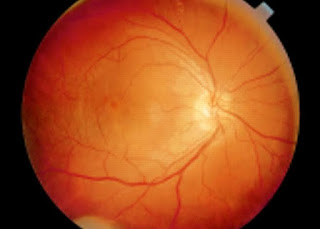What is Macular Edema?
Macular Edema may be a condition that leads to swelling or thickening of the attention ’s macula – the a part of the eye liable for detailed, sight .
Macula may be a very small area at the middle of the retina—a thin layer of light-sensitive tissue that lines the rear of the attention .
Light rays are focused on the retina, where they're transmitted to the brain and interpreted because the images you see.
it's the macula that's liable for your pinpoint vision, allowing you to read, sew or recognize a face.
Leaking of fluids within the blood vessels of the retina, leads to the event of macular Edema. A swollen macula doesn't function properly.
Vision loss could range from being mild to severe, but in many cases, doesn't affect the sight .
Macular edema is usually a complication of diabetic retinopathy, many an times diabetic retinopathy leads to complications like macular edema, and is that the commonest sort of vision loss for people with diabetes—more so if left untreated. (AAO)
Causes of Macular Edema
Macular Edema occurs when there's abnormal leakage and accumulation of fluid within the macula from damaged blood vessels within the retina.
Eye surgery, in association with age-related degeneration , or as a consequence of inflammatory diseases that affect the attention also can cause the event of macular edema.
Any disease that damages blood vessels within the retina can cause macular edema.
Some of the opposite macular edema causes include:
Uveitis
Occlusion of retinal vein
Macular degeneration with age
Radiation, macular telangiectasis related blockage within the small veins of the retina
Medication side-effects
Certain genetic disorders, like retinoschisis or retinitis pigmentosa
Symptoms of Macular Edema
Macular edema is usually painless and should display few symptoms when it develops. When symptoms do occur, they're a symbol that the blood vessels in your eye could also be leaking.
Symptoms of macular edema may include:
Blurred of wavy sight
Colours appear washed out or changed
If you've got macular edema symptoms, you ought to see an ophthalmologist directly .
If left untreated, macular edema can cause severe vision loss and even blindness. (AAO).
Diagnosis of Macular Edema
To diagnose macular edema, eye care professional will conduct a radical eye exam and appearance for abnormalities within the retina.
the subsequent tests could also be done to work out the situation and extent of the disease:
Visual acuity test: a visible acuity test may be a common thanks to identify vision loss and may help to diagnose vision loss as a results of macular edema.
Dilated eye exam: A dilated eye exam is employed to more thoroughly examine the retina.
It gives additional information about the condition of the macula and helps detect the presence of vessel leakage or cysts.
Fluorescein angiogram: If earlier tests indicate the likelihood of getting macular edema, the attention care professional may perform a fluorescein angiogram test to spot the quantity of injury to the macula.
Optical coherence tomography: This test detects the thickness of the retina then it’s useful in determining the quantity of swelling within the macula.
The Amsler Grid: The Amsler Grid provides a simple thanks to test whether or not the sight has changed. It can recognize even small changes within the vision.
OPTOMETRY-SHARP VISION
Optometrist

